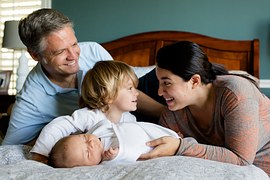Pope Francis Praises Personal Freedom in Family Life
 The four keys to a lasting marriage are faithful, free, fruitful, and total love, as we explain in our newly released book on Catholic marriage. Pope Francis stresses these same four themes in his recent exhortation Amoris Laetitia (Joy of Love). Our last article looked at what the pope had to say about the first key, faithfulness, and this post looks at his praise of personal freedom, the second key.
The four keys to a lasting marriage are faithful, free, fruitful, and total love, as we explain in our newly released book on Catholic marriage. Pope Francis stresses these same four themes in his recent exhortation Amoris Laetitia (Joy of Love). Our last article looked at what the pope had to say about the first key, faithfulness, and this post looks at his praise of personal freedom, the second key.
Some people fear that marriage or family life will restrict their freedom. But in Amoris Laetitia, Pope Francis asserts that faithful love and personal freedom are not contradictory. He says:
“freedom and fidelity are not opposed to one another; rather, they are mutually supportive, both in interpersonal and social relationships. … Honouring one’s word, fidelity to one’s promises: these are things that cannot be bought and sold. They cannot be compelled by force or maintained without sacrifice” (214).
Freedom is not the same as license, the pope reminds us. “It is easy nowadays to confuse genuine freedom with the idea that each individual can act arbitrarily, as if there were no truths, values and principles to provide guidance, and everything were possible and permissible,” he laments (34). This false idea of freedom leads people to sweep aside their commitment to love “whenever it proves inconvenient or tiresome” (id.). A self-centered lack of faith in the future is the opposite of true freedom.
“Free love” and “free choice” have become dirty words in some circles. But true “freedom of choice makes it possible to plan our lives and to make the most of ourselves” (33). A freedom enriched by “noble goals” and “personal discipline” is precisely what allows each of us “to give oneself generously to others” (id.).
A person who knows how to give love freely and generously will patiently wait for a free gift of love in return. “Indeed, the deeper love is, the more it calls for respect for the other’s freedom and the ability to wait until the other opens the door to his or her heart,” states Pope Francis (99). A mature love does not fear:
we do not have to control the other person, to follow their every step lest they escape our grip. Love trusts, it sets free, it does not try to control, possess and dominate everything. This freedom, which fosters independence, an openness to the world around us and to new experiences, can only enrich and expand relationships. … [T]his freedom makes for sincerity and transparency, for those who know that they are trusted and appreciated can be open and hide nothing. Those who know that their spouse is always suspicious, judgmental and lacking unconditional love, will tend to keep secrets, conceal their failings and weaknesses, and pretend to be someone other than who they are (115).
A person who knows how to love freely and generously will also willingly take second place, realizing that the first place in every person’s life, even a spouse, belongs to God. Francis explains: “There comes a point where a couple’s love attains the height of its freedom and becomes the basis of a healthy autonomy. This happens when each spouse realizes that the other is not his or her own, but has a much more important master, the one Lord” (320).
Just as loving spouses don’t seek total control over each other, they don’t seek to micromanage their children’s choices either, according to Pope Francis. Instead, the parents’ responsibility is teach their children “the wise use of freedom” (274). He explains:
Obsession … is not education. We cannot control every situation that a child may experience. …. What is most important is the ability lovingly to help them grow in freedom, maturity, overall discipline and real autonomy. Only in this way will children come to possess the wherewithal needed to fend for themselves and to act intelligently and prudently whenever they meet with difficulties. The real question, then, is not where our children are physically, or whom they are with at any given time, but rather where they are existentially, where they stand in terms of their convictions, goals, desires and dreams (261).
As children develop their own personalities and talents and discover their own path, they can teach their parents as much as their parents have taught them. “Inevitably, each child will surprise us with ideas and projects born of that freedom, which challenge us to rethink our own ideas. This is a good thing,” maintains the pope (262).
In short, freedom in family life “is something magnificent,” he says (267).

